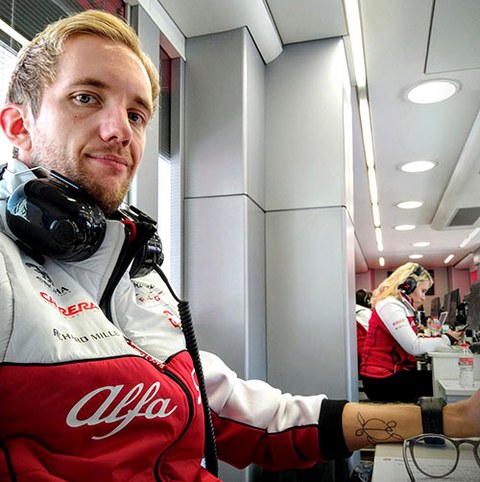Strategy engineer at Formula 1
(Interview from 2021)
Dagmar Möbius
Florian Fiedler is a strategy engineer. It’s his job to help Formula 1 drivers reach the podium. As a child, he enjoyed tinkering in his grandpa's workshop. Later, he stopped finding "normal cars" quite so exciting after an internship, but his love for racing cars grew. The mechanical engineer spoke to "Kontakt-online" about his typical working day, simulations when working from home, and alternative career prospects.
Florian Fiedler grew up in a village near Paderborn and always wanted to do "something with cars." "I've known that since before I could walk," he laughs.
Tire changes, clock repairs, and "repairs on anything that does anything" were par for the course in his grandpa's workshop. "We did a lot of tinkering, and nothing was thrown away – that was normal for me," he recalls. He drove a car for the first time at the age of 14. "On quiet roads, of course," he laughs.
When choosing where to study, Florian Fiedler was focused on the "automotive elite" and began a mechanical engineering degree at the University of Stuttgart in October 2012. "I didn't think about East Germany at all," he said. Until he visited Dresden with his then-girlfriend, who came from the city. "I liked Dresden right away, and after ten minutes had decided to move." Florian Fiedler switched to TU Dresden from his third semester on, and specialized in automotive engineering. "A lovely city and an excellent university," says the 28-year-old.
When he was 22, Florian Fiedler was surprised to be accepted for an internship at Porsche. "I thought that maybe aged 40 or so I might be allowed to enter the hallowed halls, and I applied," he recalls. He spent six months in various areas including working on emissions tests for hybrid cars. Then came the realization: he "didn't find normal cars all that interesting anymore." So, in his eighth semester, he joined the Elbflorace student club. "Unfortunately very late in the day, but I wanted to know as much as I could to be useful. But things could have worked out very differently," he believes. With his experience, he quickly became one of the "established experts", and was involved in major decisions for the Formula Student Team.
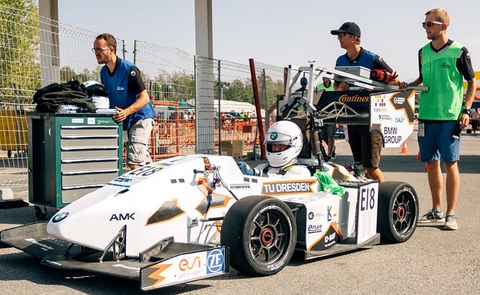
Florian Fiedler was part of the student club "Elbflorace", through which he participated in the world's largest design competition for students: Formula Student.
Florian Fiedler regularly invested 30 hours a week – and sometimes up to 60 to 70 hours – as the lead on the performance module. He spent "almost every free minute" in the workshop in Dresden-Nickern. How fast can you drive a lap? In simulations, he tested parameters such as tire pressure, weight, and power for the racecars, and trained the drivers. He was involved in four or five races a year right across Europe. Two first-place spots in Spain in Formula Student are particularly proud achievements, and not just because the track was the one used by Formula 1. "It was fun to work in small, highly motivated motorsport teams with very little red tape. My time with Elbflorace was the perfect preparation for my career." Florian Fiedler wrote his final-year dissertation on autonomous driving at Porsche. In other words, he explored how to teach an electric car to drive itself on the roads. While working on his dissertation, he landed a place in Red Bull Racing's trainee program. "That's how I ended up as a strategy engineer in Bologna, Italy, at Scuderia Toro Rosso (now Alpha Tauri) right after graduating in 2018."
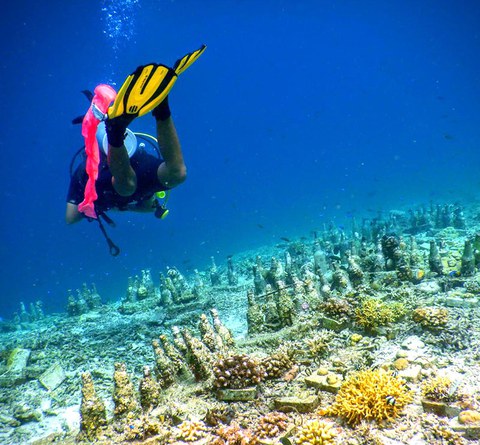
In Borneo, he worked with the NGO Tropical Research and Conservation Centre.
After a year on the job, the automotive engineer decided it was time to reevaluate his career, and set off on a backpacking trip. He ended up on a tiny island off the coast of Borneo, where he worked with the NGO Tropical Research and Conservation Centre for six months, helping to restore damaged coral reefs.
Being faster than other people still fascinates Florian Fiedler. More than agonizing over "how to save four cents on the next side-view mirror," he smiles. Formula 1 brought him back to Europe. For the past year and a half, he has been working as a strategy engineer at Alfa Romeo Racing in Switzerland – where to his knowledge, he is the first TU Dresden graduate. Coronavirus has meant working a lot from home, and in motorsport, the teleworking office is the "Remote Operation Room". The drivers can be in Brazil while he is in Switzerland. There is no such thing as a typical working day. Preparations begin around ten days before the next race. What will the weather be like? What tire performance can be expected? What about the engine? All calculations and simulations are done on his laptop. "It's somewhere between poker and chess; on Sundays, you lay your cards on the table."
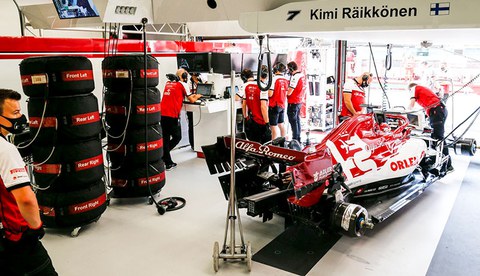
Strategy engineers like Florian Fiedler help decide the outcome of races. He learned the nuts and bolts of the trade in his automation degree at TUD.
Florian Fiedler spends a number of weekends each year at the racetrack; he was recently in Spielberg, Austria, and Silverstone in the UK. "We're the ones yelling at people over the radio to change the tires," he explains. In his case, so that Kimi Raikkönen or Antonio Giovinazzi can head for the podium. Strategy engineers help decide the outcome of a race. "The Formula 1 drivers have to trust us when they go around a bend at 350 km/h," he says. When a warning light comes on, instead of panicking, he sometimes thinks back to TUD lectures with Professor Stefan Odenbach (Chair of Magnetofluiddynamics, Measurement and Automation Technology): "He taught us when to trust readings and when not to."
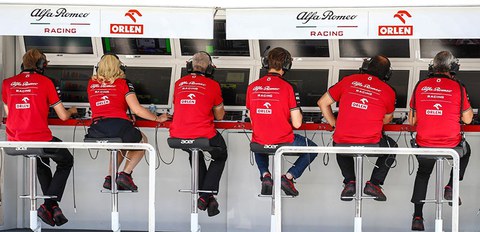
"We're the ones yelling at people over the radio to change the tires."
Florian Fiedler is happy with his job in motorsports. Although he loves fast cars, he himself rides a bicycle. He runs and has competed in triathlons. He has been dancing since he was a child and is involved in organizing folk dance festivals. He plays the guitar and trumpet and sings in a band. He also dives. Sustainability is a topic close to his heart, and not just since Borneo. Were a career change on the cards at some point, he could see himself going into marine biology. "Not everything is about travelling faster, higher, further," he says. But right now, he's enjoying it.
Contact:
Florian Fiedler
Strategy Engineer
Sauber Motorsport AG
Wildbachstrasse 9
CH-8340 Hinwil
Tel.: +41 44 937 92 50
E-Mail
Web

